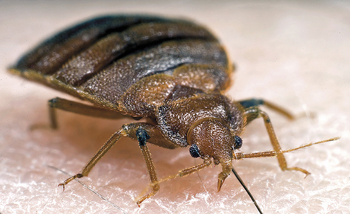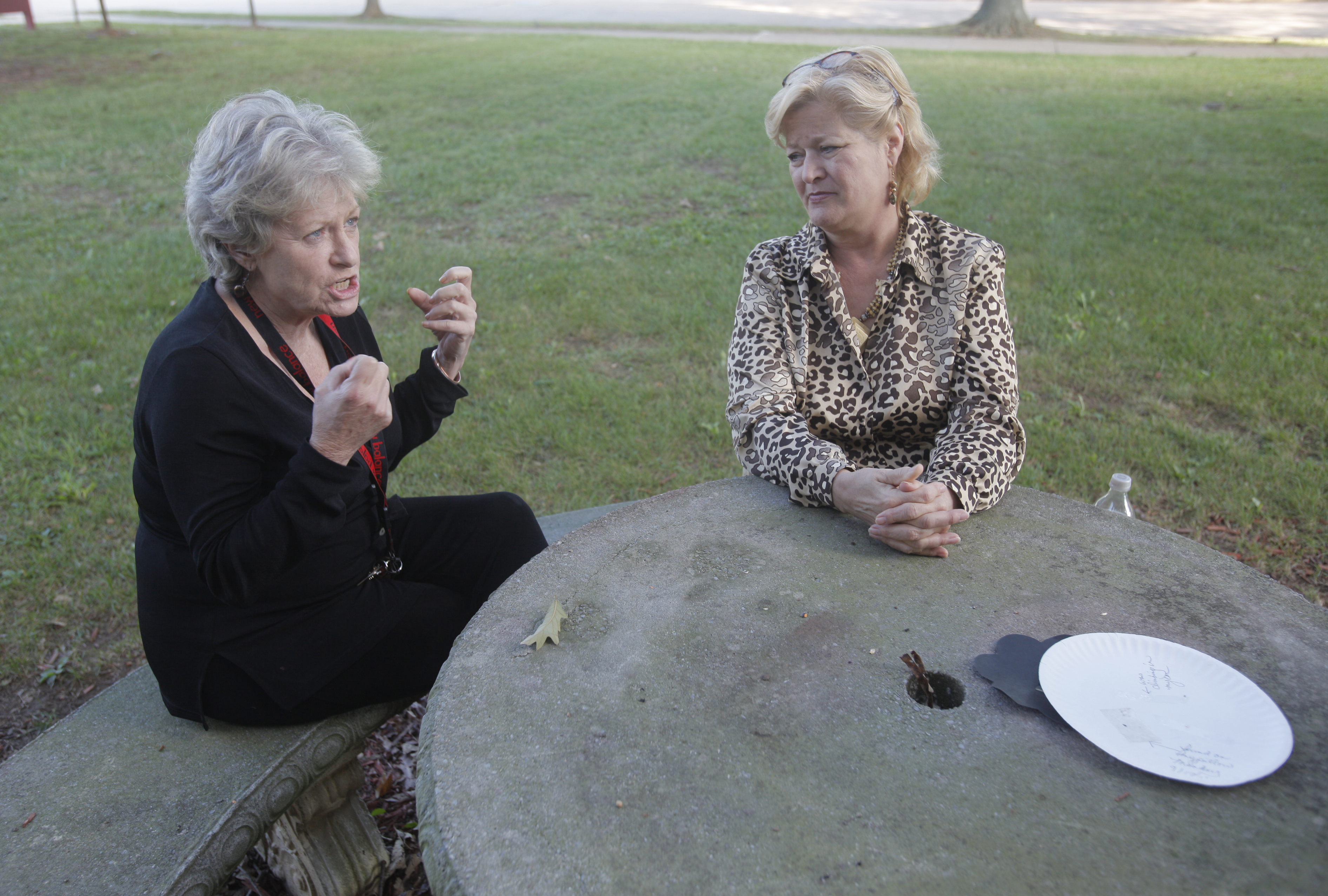ABOUT BEDBUGSAppearance: Bedbugs are about the size of an apple seed. The pests are reddish-brown, oval and flat.Bites: Bedbug bites usually do not pose a serious medical threat. The best way to treat a bite is to avoid scratching the area and apply antiseptic creams or lotions and take an antihistamine.Infestations: Bedbug infestations are commonly treated by insecticide spraying. If you suspect that you have an infestation, contact your landlord or professional pest control company that is experienced with treating bedbugs. The best way to prevent bedbugs is regular inspection for the signs of an infestation.Sources: Mayo Clinic website, Centers for Disease Control and Prevention website
Bedbugs hit Joan Tate's Dogwood Manor apartment in March. Six months and three exterminations later, the bugs still are biting her, she says.
The latest extermination, conducted in September, killed some of the pests, but they're not all gone, Tate said. She fears it's only a matter of time before the bugs multiply and overtake her apartment again.
"It's driving me crazy," she said. As a result of the infestation, she said, she sees "a psychiatrist and a stomach specialist." She was so desperate to stop the bites, she sprayed Raid insecticide all over her body, she said.
"It got better in my room (after the September extermination) but the building is infested," she said, so the pests only move from a treated apartment to a nontreated one.
Dogwood Manor is managed by the Chattanooga Housing Authority.
CHA officials say the Dogwood building is not infested, although they acknowledge that seven residents have reported having bedbugs and their rooms have been treated. However, CHA officials said to protect the privacy of residents, they will not say how many times the seven apartments have been treated. Tate said her apartment was treated three times, including the latest time in September.
The entire 136-unit apartment complex should have been treated, said Roxann Larson, resident council president at Dogwood Manor.
Housing officials also provided treatments for four residents at the Boynton Terrace complex who also reported having bedbugs.
More people at Dogwood have them, but they're ashamed to report them, Larson said. She taped bedbugs to a paper plate as proof of her complaint. She said she took one of the bugs out of her ear.
"It's very emotionally taxing because you're so afraid you're going to get bit and then you do," Larson said.
Housing officials said the agency recently requested and received proposals from several professional pest control companies to implement a pest control management plan specifically for bedbugs. The proposals are under evaluation by CHA staff, said Doug Wrinn, CHA's director of asset management. However, CHA officials said they could not say when a plan to prevent bedbugs would be implemented.
Bedbugs were widespread in the country until World War II when the use of pesticides wiped them out, according to the website bedbugcentral.com. But pest extermination practices and products have changed over the decades and bedbugs have returned, hitting hotel rooms, apartment complexes and homes with a vengeance.
Resurgence of the bugs could be caused be an increase in travel, a lack of awareness about the bugs and changes in pesticides used to treat outbreaks, according to the U.S. Centers for Disease Control and Prevention website.
"The United States is one of many countries now experiencing an alarming resurgence in the population of bedbugs," according to the site.
Public health agencies across the country have been overwhelmed by complaints about the bugs, according to the CDC. The bugs hide in the folds, crevices and seams of upholstered furniture and mattresses. They feed on blood and depend on humans, pets or other animals to get it.
"Once these pests find a meal ticket, they move in for good," according to the website insects.about.com.
Because people aren't knowledgeable about bedbugs, they pick up furniture off the street with little concern about insects they may bring into their home. And because stronger pesticides such as Poxporur, DDT and chlordane that once wiped out the bedbugs also made some people sick, they have been banned for use as a treatment, said Billy Jackson, branch manager of Bug Busters exterminators in Chattanooga.
"We're never going to get totally rid of them," Jackson said. "It's because the pesticides available today are nowhere near as good and potent as they were back in the day."
Tate says she has trouble sleeping and eating because she's watching for bugs.
"I just killed a bug on my pillow the other night and it was full of my blood," she said.
Even after the Terminix extermination this month, she has visible bites on her face and neck.
"This is nothing. I was covered with bites," Tate said. "I've been very, very depressed."
The bugs don't carry disease, but their bite does leave an itching allergic reaction on human skin, according to the CDC.
Chattanooga-Hamilton County Health Department officials said they have received no complaints from Dogwood Manor but have had 10 bedbug complaints this year. The agency had 17 complaints in 2010.
Bug Busters said it has treated about 12 sites so far this year in the Chattanooga area. Jackson said the company does not disclose places that have been treated.
Bug Buster officials said bedbugs can be expensive to treat. Prices start at $300 per room, and many times it's necessary to treat more than one room.
 This 2006 photograph depicted a frontal view of an adult bed bug, Cimex lectularius, as it was in the process of ingesting a blood meal from the arm of a "voluntary" human host.
This 2006 photograph depicted a frontal view of an adult bed bug, Cimex lectularius, as it was in the process of ingesting a blood meal from the arm of a "voluntary" human host.Bed bugs are not vectors in nature of any known human disease. Although some disease organisms have been recovered from bed bugs under laboratory conditions, none have been shown to be transmitted by bed bugs outside of the laboratory. Bed bug bites are difficult to diagnose due to the variability in bite response between people, and due to the change in skin reaction for the same person over time. It is best to collect and identify bed bugs to confirm bites. Bed bugs are responsible for loss of sleep, discomfort, disfiguring from numerous bites and occasionally bites may become infected. The common bed bug C. lectularius is a wingless, red-brown, blood-sucking insect that grows up to 7 mm in length and has a lifespan from 4 months up to 1 year. Bed bugs hide in cracks and crevices in beds, wooden furniture, floors, and walls during the daytime and emerge at night to feed on their preferred host, humans.
Bed bug bites can result in clinical manifestations; the most common are small clusters of extremely pruritic, erythematous papules or wheals that represent repeated feedings by a single bed bug. Less common but more severe manifestations include grouped vesicles, giant urticaria, and hemorrhagic bullous eruptions. Bites should be managed symptomatically with topical emollients, topical corticosteroids, oral antihistamines, or some combination of these treatments.
Then people are asked to purchase mattress covers intended to smother any bedbugs on the mattress and prevent any new infestation from getting to the mattress. The covers run from about $100 to $125 at Bug Busters, depending on the size of the mattress, Jackson said. The mattress cover is in addition to the $300 per room.
People almost have to pack up and move to get rid of the bugs, Jackson said.
"We require them to dispose of box spring mattresses or purchase a bedbug cover," he said. "They have to wash all their clothes that they keep and dry them with high heat. It's the high heat, not the washing, that kills them. Then we do a treatment with spray. All pictures have to be removed from the walls, and then you have to inspect everything before you go back in."
Larson said when the complaints were made at Dogwood Manor in March, CHA officials accused residents of being senile and the bugs multiplied.
"When I first reported it, he told me that he heard I was unsanitary. I mean he had me in tears," said Tate, referring to Dogwood resident manager Anthony Fears.
CHA officials say Tate's statement is untrue.
After receiving a complaint about bedbugs, CHA had a professional pest control service inspect all 136 units in Dogwood, according to a CHA written response. The professional service found only two units with bedbugs in March. Bedbugs were found in other units months later, CHA said.
Tate, a retired hairdresser who still styles hair for some residents at another Westside high rise, said she believes the bedbugs came from that housing site.
The bedbug problem is costing low-income residents money they say they don't have, and residents are asking CHA to reimburse them or to compensate them for their losses.
Tate said she has only a bed in her apartment because Fears made her throw out her two sofas and said she could no longer bring used furniture into her apartment. She said she also threw out several pieces of clothing because she couldn't afford to wash them.
Housing officials said that depending on the extent of the bedbug problem, the professional pest control service might suggest removing bedding or furniture. If items are thrown out for that reason, CHA will not replace the items, an agency spokeswoman said.
Larson said she also threw out her sofa.

